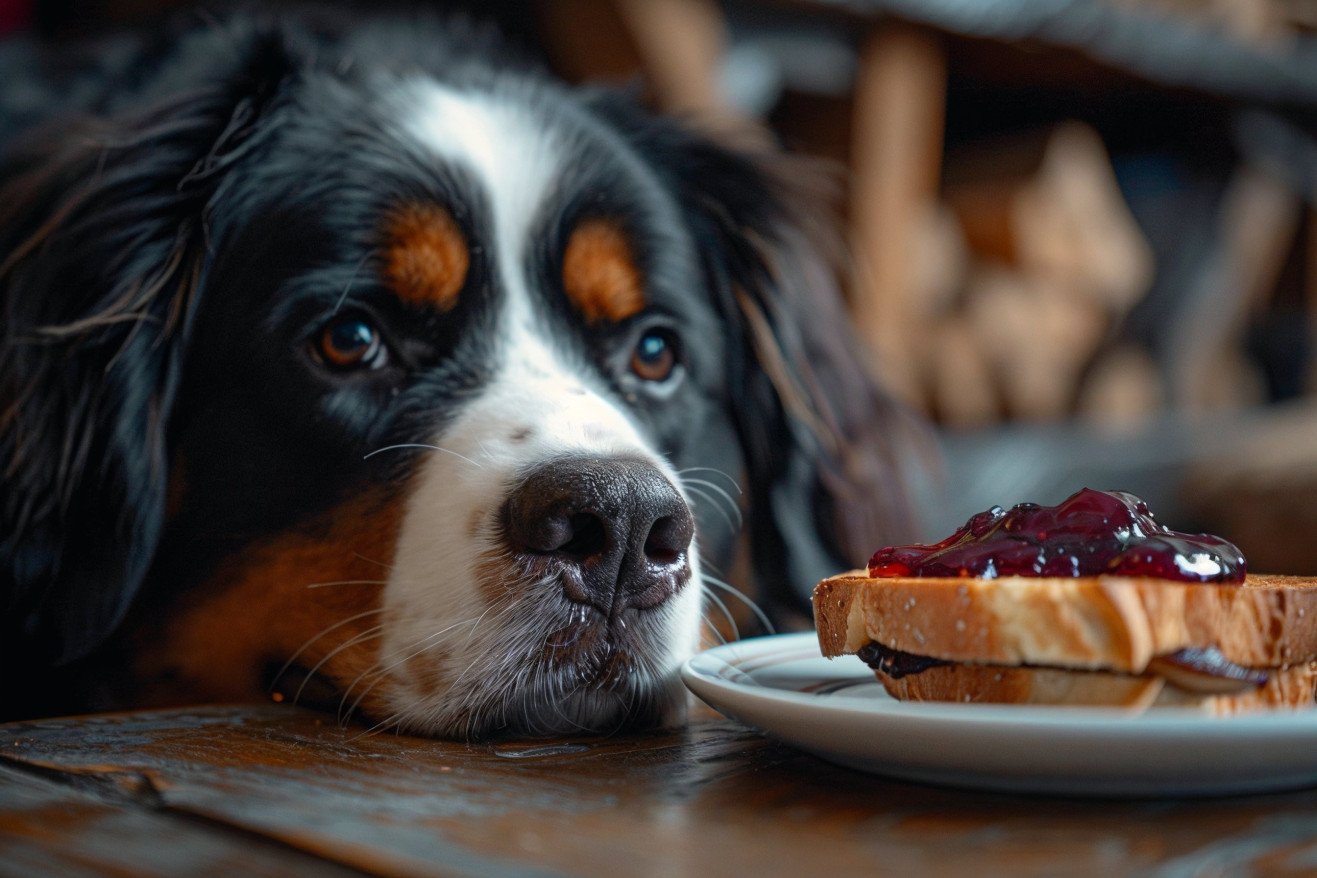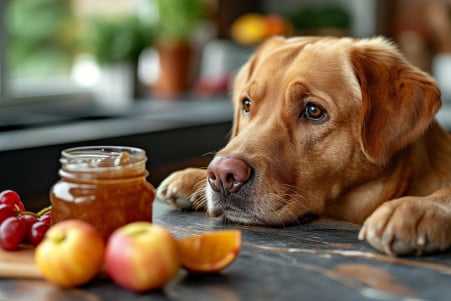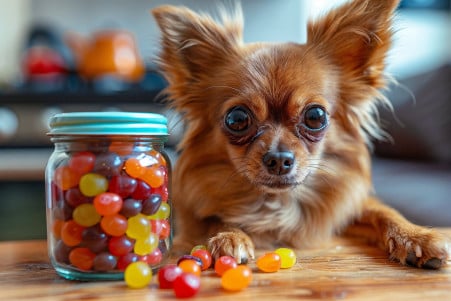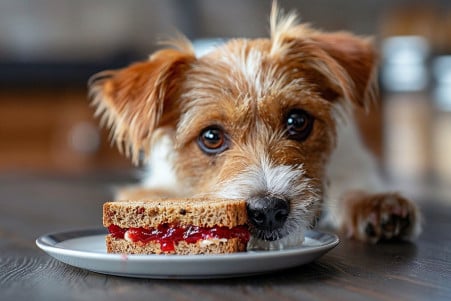Can Dogs Have Grape Jelly? What You Need to Know About the Risks
31 March 2024 • Updated 31 March 2024

If you like to indulge in a peanut butter and grape jelly sandwich, you may be tempted to share this sweet snack with your dog. However, the risks involved may make you think twice. While most dogs won’t experience toxicity from eating a small amount of grape jelly, it’s best to avoid giving it to them because of the toxic substances in grapes and raisins that can cause acute kidney failure.
We’ll explore the most up-to-date findings from veterinary toxicologists, veterinary nutritionists, and animal behaviorists to help you understand the potential risks of letting your dog eat grape jelly and other grape products. By the end of this article, you’ll know exactly why you should avoid feeding this sweet treat to your dog and you’ll also learn about other treats that are safer and can still satisfy your dog’s sweet tooth.
Can dogs eat grape jelly?
What We Know About Grapes and Raisins
The toxicity of grapes and grape products, including raisins and currants, in dogs is a well-documented problem, and the toxic substance is unknown. According to research from VCA Animal Hospitals, the toxic dose is low, with as little as 32 grams of grapes per kilogram of a dog's body weight being potentially toxic. The exact cause of the toxicity is unknown, but some dogs are more susceptible than others and can develop toxicity after consuming just a few grapes or raisins.
The initial signs of grape toxicity, including vomiting, anorexia, and lethargy, can occur within 24 hours of ingestion, according to Dr. Carly Fox, cited by Rover.com. However, more severe signs of kidney damage may not occur until 24-48 hours after ingestion if the dog is not treated. Immediate veterinary treatment is necessary because the toxic effects can be life-threatening if the dog is not treated to decontaminate the stomach and support the kidneys. Even one grape should be considered a medical emergency, which underscores the importance of keeping all grape products away from our dogs.
First Aid and Emergency Treatment for Grape Jelly Poisoning in Dogs
If your dog has eaten grape jelly or any other grape product, it’s important to act quickly to minimize the potential damage. According to Dr. Buzby's ToeGrips for Dogs, the first thing you should do is call a veterinarian or pet poison control hotline to get professional help. They may recommend that you induce vomiting to get the toxic substance out of your dog’s system.
The treatment will often involve activated charcoal and intravenous fluid therapy to help the dog’s kidneys, according to Greenbrier Emergency Animal Hospital. The dog will need to be monitored and have blood work done to determine the extent of the damage and make sure that the kidneys are functioning properly.
Even if your dog has only eaten one grape, the situation should be treated as an emergency because the toxic effects can be fatal if not treated by a vet right away, according to Rover.com. It’s important to get help as soon as possible because the sooner the toxin is removed, the better the dog’s chances of recovery.
More Toxic Foods and Other Household Items to Keep Away From Dogs
In addition to grapes and raisins, there are several other common household items that can be toxic to dogs. According to Hill's Pet, chocolate, caffeine, alcohol, onions, garlic, and xylitol are some of the most dangerous. WebMD also notes that raw bread dough, macadamia nuts, and certain fruits with pits can be especially dangerous.
It's important to make sure these items are safely secured and out of your dog's reach. Pets Best also notes that it's important to know the signs of poisoning, which can include vomiting, lethargy, and seizures, and to get your dog to a veterinarian right away if you suspect they've ingested something toxic. As WebMD points out, getting treatment quickly is especially important since many of these substances can be fatal if they're not treated.
Other Fruits and Vegetables That Are Good for Dogs
Even though grape jelly is not an option, there are plenty of other healthy and nutritious treats that are safe for dogs. According to the American Kennel Club, some fruits that are safe for dogs include apples, bananas, blueberries, and watermelon, all of which can offer vitamins and fiber. In addition, carrots, green beans, and sweet potatoes are low-calorie vegetables that can also be a good crunchy snack for dogs.
The Wildest notes that it's important to remember that treats should be given in moderation and should account for no more than 10% of a dog's daily caloric intake. Purina also says that it's important to talk to a vet before giving a dog any new food to make sure that it's safe and that the portion size is appropriate.
Keeping Your Pet Safe and Healthy
Grape jelly and other grape products are not safe for dogs and should be avoided. According to Dogster, grapes contain tartaric acid, which is known to cause sudden kidney failure in dogs. There is no safe level of exposure, and even small amounts of grape products like jelly can be toxic.
The ingredients in grape jelly, such as grape juice, corn syrup, and citric acid, all contain grape-based elements that are toxic to dogs. Symptoms of grape toxicity can include a loss of appetite, weakness, vomiting, and decreased urine production. Immediate veterinary care is necessary because the toxicity of grapes can be life-threatening if not treated promptly.
PetMD warns that dogs should not eat grapes, raisins, jams, or jellies. There are no health benefits to giving grape jelly to dogs. Instead, pet parents should make sure their dogs are eating a well-rounded diet and give them healthy treats like apples, bananas, and blueberries.
As explained by Pupford, many fruits and vegetables can be great low-calorie snacks for dogs. However, it's important to make sure that these items are prepared and served in a way that doesn't pose a choking hazard or other risk. It's always a good idea to check with a vet before adding new foods to a dog's diet.
Final Considerations: Evaluating the Risks of Grape Jelly for Dogs
Grape jelly and other grape products should be avoided due to the risk of sudden kidney failure in dogs. If a dog consumes grapes or grape-based products, it's important to seek veterinary care as soon as possible.
Pet parents can help protect their pets by keeping toxic human foods and other items out of their reach. Providing dogs with a well-balanced diet and healthy treats is important for their health. This means that pet parents should be aware of what foods are safe and unsafe for their dogs.


